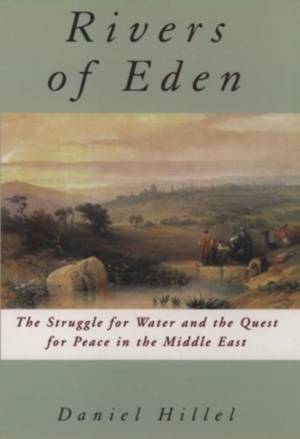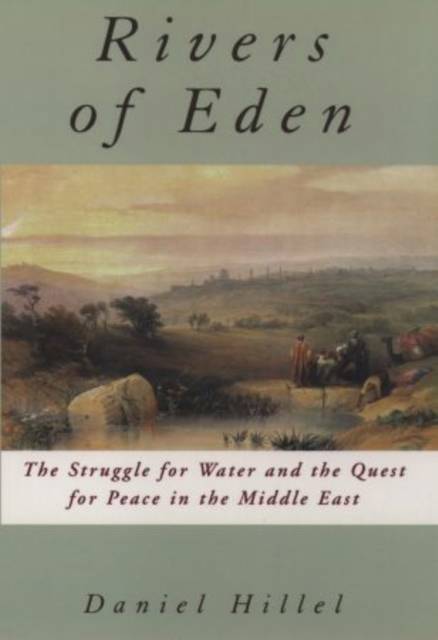
Bedankt voor het vertrouwen het afgelopen jaar! Om jou te bedanken bieden we GRATIS verzending (in België) aan op alles gedurende de hele maand januari.
- Afhalen na 1 uur in een winkel met voorraad
- Gratis thuislevering in België
- Ruim aanbod met 7 miljoen producten
Bedankt voor het vertrouwen het afgelopen jaar! Om jou te bedanken bieden we GRATIS verzending (in België) aan op alles gedurende de hele maand januari.
- Afhalen na 1 uur in een winkel met voorraad
- Gratis thuislevering in België
- Ruim aanbod met 7 miljoen producten
Zoeken
Rivers of Eden
The Struggle for Water and the Quest for Peace in the Middle East
Daniel Hillel
Hardcover | Engels
€ 53,45
+ 106 punten
Omschrijving
After years of discord, peace in the Middle East now seems close at hand. But the hope of a settlement stands on much shakier ground than the participants suspect, says scientist Daniel Hillel. What they don't see, and what most observers overlook, is that the severely wounded environment of the region threatens to undercut any long-lasting accord. The widespread destruction of vegetation and natural habitats, the erosion of uplands, the desertification of semiarid areas, waterlogging and salinization of valleys, and, most of all, the depletion and pollution of precious water resources--no political formula will promote lasting peace in the Middle East, argues Hillel, unless it addresses these ills.
In Rivers of Eden, Hillel examines this natural crisis and explores its crucial role in the political and economic future of this troubled region. He shows how environmental degradation, exacerbated by an uncontrolled explosion of population, is itself a cause of strife in the area, dislocating and disorienting countless people and fomenting despair and extremism. And yet, he adds, since no one country in the region can solve its water problem alone, the very cause of conflict is also an inducement for promoting peace. This hope illuminates Rivers of Eden as it traces the vital issue of water in the Middle East, ranging from its first appearance in folklore and religion to the present. As Hillel shows, the history of civilization in the Middle East is in many ways the story of how societies in this arid environment managed or mismanaged their land and water resources. Here we see how this history plays out from intertribal rivalty (for instance, the legendary "War of Basoos," begun
over the errant trespass of a thirsty camel), to the choking of the mighty Nile at Aswan and the slow, salt-poisoned death of Mesopotamia. From the historical and scientific circumstances of the region's water resources, Hillel turns to conflicts brewing even now over the waters of the Euphrates-Tigris, the Nile, the Jordan, and several groundwater aquifers. The future welfare of the Middle East, as of many economies around the world, depends on timely action to resolve these issues. This book offers hope for such a resolution.
A world renowned environmental scientist, Hillel has worked throughout the Middle East, as consultant to the governments of Israel, Pakistan, the Sudan, Iran, Egypt, Ethiopia, and elsewhere, and as an advisor to the World Bank. He brings first-hand insight to his account and an urgent concern for the degraded Fertile Crescent, which he believes can and must be rehabilitated. Comprehensive, penetrating, and clear, his book compels the attention of anyone interested in the future of the Middle East and of the environment at large.
In Rivers of Eden, Hillel examines this natural crisis and explores its crucial role in the political and economic future of this troubled region. He shows how environmental degradation, exacerbated by an uncontrolled explosion of population, is itself a cause of strife in the area, dislocating and disorienting countless people and fomenting despair and extremism. And yet, he adds, since no one country in the region can solve its water problem alone, the very cause of conflict is also an inducement for promoting peace. This hope illuminates Rivers of Eden as it traces the vital issue of water in the Middle East, ranging from its first appearance in folklore and religion to the present. As Hillel shows, the history of civilization in the Middle East is in many ways the story of how societies in this arid environment managed or mismanaged their land and water resources. Here we see how this history plays out from intertribal rivalty (for instance, the legendary "War of Basoos," begun
over the errant trespass of a thirsty camel), to the choking of the mighty Nile at Aswan and the slow, salt-poisoned death of Mesopotamia. From the historical and scientific circumstances of the region's water resources, Hillel turns to conflicts brewing even now over the waters of the Euphrates-Tigris, the Nile, the Jordan, and several groundwater aquifers. The future welfare of the Middle East, as of many economies around the world, depends on timely action to resolve these issues. This book offers hope for such a resolution.
A world renowned environmental scientist, Hillel has worked throughout the Middle East, as consultant to the governments of Israel, Pakistan, the Sudan, Iran, Egypt, Ethiopia, and elsewhere, and as an advisor to the World Bank. He brings first-hand insight to his account and an urgent concern for the degraded Fertile Crescent, which he believes can and must be rehabilitated. Comprehensive, penetrating, and clear, his book compels the attention of anyone interested in the future of the Middle East and of the environment at large.
Specificaties
Betrokkenen
- Auteur(s):
- Uitgeverij:
Inhoud
- Aantal bladzijden:
- 368
- Taal:
- Engels
Eigenschappen
- Productcode (EAN):
- 9780195080681
- Verschijningsdatum:
- 15/12/1994
- Uitvoering:
- Hardcover
- Formaat:
- Genaaid
- Afmetingen:
- 162 mm x 244 mm
- Gewicht:
- 789 g

Alleen bij Standaard Boekhandel
+ 106 punten op je klantenkaart van Standaard Boekhandel
Beoordelingen
We publiceren alleen reviews die voldoen aan de voorwaarden voor reviews. Bekijk onze voorwaarden voor reviews.












